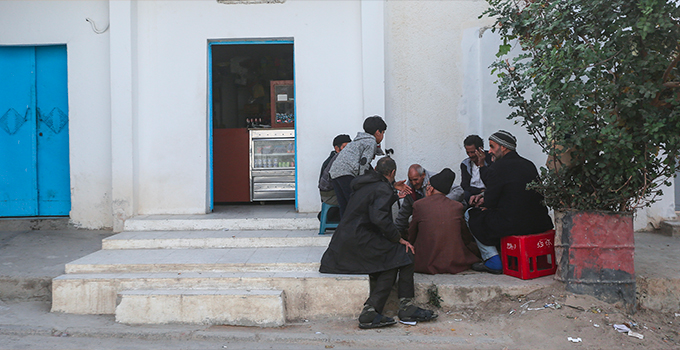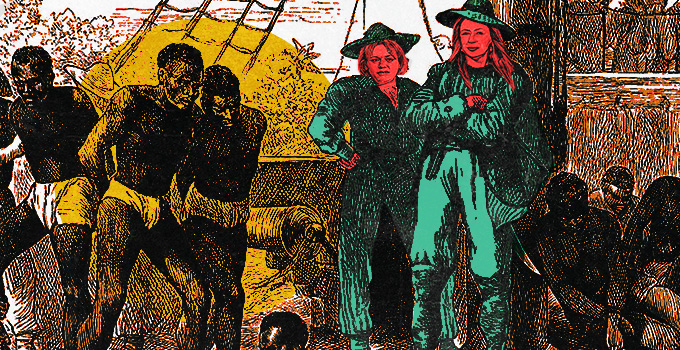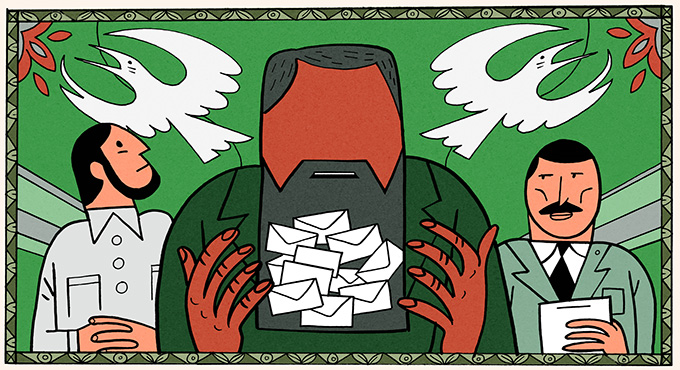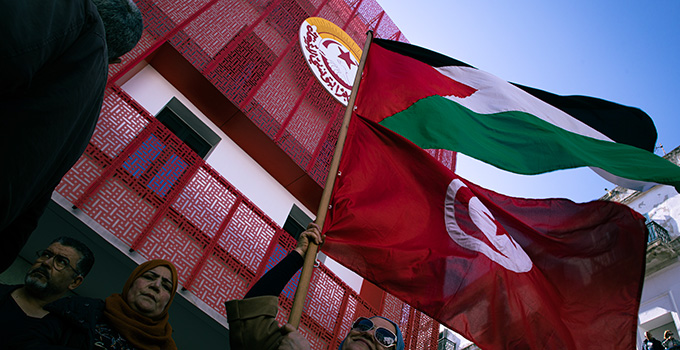« The 9 or 12% who participated in the last elections are worth more than the 99% who participated in their elections; it produced a deluge of congratulatory letters. We need congratulatory letters from the Tunisian people ».
This statement is an excerpt from the speech made by president Kais Saied on December 28, 2022. Accompanied by the prime minister, ministers of the interior, justice and defense as well as high officials from the civil and military armed forces, the president launched a particularly virulent attack. Although he didn’t name any names, Saied directed the attack upon his opponents, judges and media figures accused of corruption. This was the president’s first speech since the first round of legislative elections on December 17, 2022.

In spite of the fact that his 2019 presidential campaign slogan was « the people want », and that the entire process set into motion on July 25, 2021 was built upon the idea of strong popular support, the underperformance that has characterized elections brings the government face to face with a dilemma: how to claim the support of a people who deserted elections that were designed to set the stage for the new regime?
« The people » of president Kais Saied
Much like other populist leaders, Kais Saied positions the people, presumably pure and homogenous, in opposition with a corrupt elite. Evidently, every leader defines « his » people. This notion is not to be confused with the electoral body. For example: the (especially political) elite of a country is by definition electoral. Populist discourse, however, excludes it from the popular camp. In Western countries, populists of the extreme right define the people on the basis of ethnicity (whites, European descendants) and religion (Christians).
Kais Saied’s vision of « the people » was conceived by Ridha Chiheb El Mekki, known as Ridha Lénine. In the May 2015 publication of the magazine Al hiwar al moutamedden, the regime’s theorist proposed defining a « historical period » as the social basis of the 2010-2011 revolution. El Mekki’s vision attempts to constitute as vast a body as possible beginning with the most vulnerable segments of the population—those who initiated the insurrection movement of 2010. Lénine excludes only « the detrimental minority of society that is affiliated with the creation and distribution of riches » as well as « those who dispose of an absolute influence in decisions relating to politics and the media ».
As for the president, it was not until his speech on September 20, 2021 at the governorate headquarters in Sidi Bouzid—two days before the promulgation of decree 117—that it became possible to discern the contours of « his » people. According to Saied, his are a people who reject the entire political and institutional structure in place since January 14, 2011. In this view of events, the people « rectified the course of its revolution » on July 25, 2021. This same vision would surface the following year in the preamble of the 2022 constitution.

Popular support was measured by several elements: the concerts of car horns and jubilant crowds on the night when « exceptional measures » were taken; support by the majority of political elites and civil society actors (of which the public more or less approved); flattering polls.
But what might then have been perceived as support for the president’s initiative was very quickly put into perspective. When the « coordinations » (groups of Saied supporters) called upon citizens to show their support against opposition demonstrations, there were never any lines out the door. In spite of public authorities’ mobilization in favor of the National Consultation, the latter only managed to engage 534,915 people, even with participation open to public servants who do not vote in national elections (armed forces, minors over 16 years of age).
Next, the referendum of July 25, 2022, despite its Soviet score—only obtained support from 28% of voters. Finally, the first round of legislative elections beat all records in terms of abstention (88%).
Underperformance during elections
Examining in detail this electoral underperformance, it becomes apparent that even key groups of Saied’s « people » did not turn out to vote. Youth, the spearhead of the president’s campaign, were very few to take part in the electronic consultation. According to official numbers, teens (ages 16-19) only constituted 2.3% of all participants, while adults between the ages of 20-29 made up 16.9%. These numbers were not enough to dissuade Saied from affirming the Consultation’s success and imposing it as a springboard for drafting the Constitution, which he considered to be an expression of popular will. But when popular will did not correspond with the president’s volition, it was the latter who had the final say. For example, when participants were invited to decide (from a list confined to six proposals) which political forms were needed, the choice for « a new Constitution », which ranked number four in the Consultation’s results with 36% of voter support, was adopted over « constitutional reform » (which placed third with 38%).
One of the objectives of the political agenda advanced by Kais Saied is to give back power to the zones which drove the revolution. In the president’s discourse as well as that of his theorists—especially the so-called « Free Tunisian Forces » (Forces tunisiennes libres) movement, two dichotomies dictate this geographical division: coastal regions/interior regions and center/outskirts of the governorate. These « losers » of the old regime and of the « black decade » should thus show much greater support Saied’s political agenda. During the 2022 referendum, voter participation was averaged at 31.45%. In Sidi Bouzid, cradle of the country’s revolution, only 30.61% of voters participated. In the interior regions of Kairouan and Kasserine, where some of the most disadvantaged delegations are located, participation rates were 25.43% and 31.01% respectively. In the first round of legislative elections, only 15% of voters in the South Kasserine/Hassi El Frid district voted, even though this region encompasses the country’s poorest delegation and only produced six candidates. The number of voters who participated was barely 2.5 times greater than the required number of endorsements for candidates.
Government tightens grip, public withdraws support
Faced with this disavowal, the discourse of the government and its allies has shifted. President of the ISIE Farouk Bouasker attributed the low participation rate in part to the absence of « political money » and to the fact that elections had been « clean ». A statement which discredits previous elections organized while he was vice-president of the ISIE and which, more significantly, insinuates that most voters only participate when they are bought.
Using the same register, former president of the Bar, Brahim Bouderbala, a regime supporter elected in the first round, lauded « the patriotism » of participants before denouncing the « nonchalance » of abstentionists. Finally, Kais Karoui, a Saied supporter from day one, explained that record abstention was due to districts being « narrow » and the fact that candidates were not well known, implicitly invalidating the presidential agenda. In all three cases, glorification of « the people » transmutes into an elitist or paternalist discourse.
This was also the tone which marked the president’s speech on December 28. When populism takes place without the people, the regime can only tighten its grip, and the ministries in charge of repression (Interior, Justice, National Defense) are there to prove it.
The presidency is not, however, the only camp facing this withdrawal of popular support. As the country’s multifactorial crisis only grows worse, none of the opposition parties are to benefit: the National Salvation Front and Free Destourian Party have not managed to mobilize anyone beyond their adherents. Other political and civil forces which do not identify with either of these two parties maintain an extremely weak support base. It’s as if the entire political battle were unfolding in the absence of one principle actor: the people.







iThere are no comments
Add yours